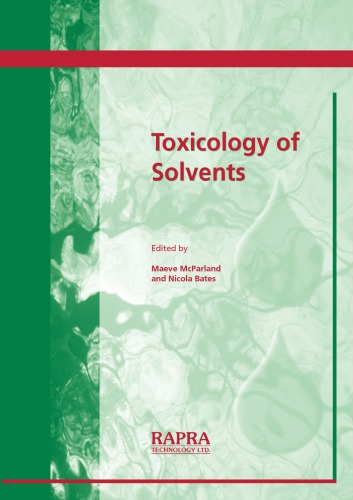

Most ebook files are in PDF format, so you can easily read them using various software such as Foxit Reader or directly on the Google Chrome browser.
Some ebook files are released by publishers in other formats such as .awz, .mobi, .epub, .fb2, etc. You may need to install specific software to read these formats on mobile/PC, such as Calibre.
Please read the tutorial at this link: https://ebookbell.com/faq
We offer FREE conversion to the popular formats you request; however, this may take some time. Therefore, right after payment, please email us, and we will try to provide the service as quickly as possible.
For some exceptional file formats or broken links (if any), please refrain from opening any disputes. Instead, email us first, and we will try to assist within a maximum of 6 hours.
EbookBell Team

4.0
66 reviews
ISBN 10: 1859573398
ISBN 13: 9781859573396
Author: Maeve McParland, Nicola Bates
Solvents Have Been The Cause Of Occupational Health Problems For Many Years. Workers Have Been Exposed Through Skin Contact, By Breathing In Vapours, By Splashes In The Eye And, In Extreme Cases, By Ingestion. This Book Examines The Clinical Consequences Of Exposure To Different Solvents, Particularly In The Workplace. Medical Professionals Will Find Useful Information About Antidotes, Tests For Exposure, And Hospital Management Of Affected Patients. A Glossary Of Medical Terms Is Included To Assist Non-medical Readers In Understanding The D104.
1. Acetone
2. Benzene
3. Carbon disulphide
4. Carbon tetrachloride
5. Chloroform
6. Diacetone alcohol
7. Diisobutyl ketone
8. N,N-dimethylformamide (DMF)
9. Ethanol
10. Ethyl sec-amyl ketone
11. Glycol ethers and esters
12. Hexane/n-hexane
13. Isopropanol
14. Methanol
15. Methylene chloride
16. Methyl n-butyl ketone (MnBK)
17. Methyl ethyl ketone (MEK)
18. Methyl isobutyl ketone (MIBK)
19. N-methyl-2-pyrrolidone (NMP)
20. Tetrachloroethylene
21. Toluene
22. 1,1,1-Trichloroethane (1,1,1-TCE)
23. Trichloroethylene
24. White spirit
25. Xylenes.
solvent toxicity chart
toxicology 101
a toxicologist often analyzes samples of
a. toxicology
a toxicologist does not study the harmful effects of
Tags: Maeve McParland, Nicola Bates, Toxicology, Solvents